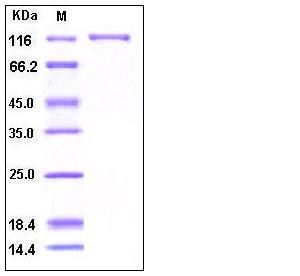Human G-CSFR / CD114 / CSF3R Protein (Fc Tag)
CD114,G-CSF R,GCSFR
- 100ug (NPP2142) Please inquiry
| Catalog Number | P10218-H02H |
|---|---|
| Organism Species | Human |
| Host | Human Cells |
| Synonyms | CD114,G-CSF R,GCSFR |
| Molecular Weight | The mature recombinant human G-CSFR/Fc is a disulfide-linked homodimeric protein. The reduced monomer consists of 835 amino acids and predicts a molecular mass of 93.3 kDa. By SDS-PAGE under reducing conditions, the apparent molecular mass of rh GCSFR/Fc monomer is approximately 120-130 kDa due to glycosylation. |
| predicted N | Glu 25 |
| SDS-PAGE |  |
| Purity | > 95 % as determined by SDS-PAGE |
| Protein Construction | A DNA sequence encoding the extracellular domain (Met 1-Pro 621) of human G-CSF receptor (NP_000751.1) precursor was expressed with the fused Fc region of human IgG1 at the C-terminus. |
| Bio-activity | Measured by its ability to inhibit GCSF-induced proliferation of NFS-60 mouse myeloid cells. The ED50 for this effect is typically 1-4 ng/ml in the presence of 0.125 ng/ml of recombinant human GCSF. |
| Research Area | Cardiovascular |Angiogenesis |Growth Factor & Receptor |Colony-Stimulating Factor (CSF) & Receptor |CSF Receptor |
| Formulation | Lyophilized from sterile PBS, pH 7.4 1. Normally 5 % - 8 % trehalose, mannitol and 0.01% Tween80 are added as protectants before lyophilization. Specific concentrations are included in the hardcopy of COA. |
| Background | Granulocyte Colony Stimulating Factor Receptor (G-CSFR), also known as CD114, which belongs to the cytokine receptor superfamily, is a cell surface receptor for colony stimulating factor 3 (CSF3). It is a critical regulator of granulopoiesis. This type I membrane protein has a composite structure consisting of an immunoglobulin(Ig)-like domain, a cytokine receptor-homologous (CRH) domain and three fibronectin type III (FNIII) domains in the extracellular region. Mutations in the G-CSF receptor leading to carboxy-terminal truncation transduce hyperproliferative growth responses, and are implicated in the pathological progression of severe congenital neutropenia (SCN) to acute myelogenous leukemia (AML). Additionally, autocrine/paracrine stimulation of G-CSFR may be important in the biology of solid tumors, including metastasis. |
| Reference |
